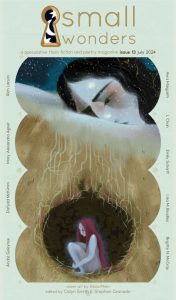GigaNotoSaurus, Diabolical Plots, Kaleidotrope, and Small Wonders: Short Fiction Reviews by Charles Payseur
 GigaNotoSaurus 7/24
GigaNotoSaurus 7/24
Diabolical Plots 7/24
Kaleidotrope Summer ’24
Small Wonders 7/24
The latest from GigaNotoSaurus is Gustavo Bondoni’s “Sambra do Espaço”, which finds Letícia working on an orbiting solar satellite array that gives power to a lot of Earth, including a disproportionate number of impoverished people. And though during Carnaval she’d much rather be watching her family dance and remembering her time in Brazil, an attack by extremists who believe the energy is cooking the Earth “like a microwave” despite no evidence to support their claims forces her into a harrowing series of risks, confrontations, and near-disasters. Bondoni does a great job of capturing both the stakes of the situation and the limitations of near-contemporary astronauts faced with an emergency in space. The result shows the ingenuity and bravery of Letícia and her crewmates as they attempt to stop ignorance and hatred for the global poor from causing a global catastrophe of incredible proportions. It’s an entertaining and thoroughly engrossing story that’s very much worth spending some time with.
Kaleidotrope’s summer issue is out and spans many genres, as with Adriana C. Grigore’s pastoral fantasy “And the Daisies Were to Blame”, which follows an older woman named Emilia on a strange train ride that seems to pass through memory itself. It’s a trip that Emilia has taken before, when she was young and met a young man, Silviu, who would become her life partner. Grigore works wonders in keeping things quiet and bordering the surreal, the train trip passing through strange and sometimes abandoned locations while Emilia sometimes acts as guide, and otherwise remembers. The aching portrait of her life is beautifully rendered, from the pain of coming out to and being rejected by her parents, to the peaceful life she managed to have with Silviu. And while there is a melancholy that permeates, a grief that is never really vanquished, there is still warmth and hope and a sense of joy that cannot be denied. Dan Peacock also contributes to the issue with “Ellipsism”, a wrenching story about a spaceship captain who ends up in a black hole, and all the people who are left behind, like the narrator who had once been her engineer, and the friends they had grown up together with. Peacock builds up a strong cast around the absence they all feel, made more difficult by the large role the captain played in getting all of them out of the generational cycles they had been in and out among the stars. She dragged them behind her, a star they all were in orbit of, but as they began to grow more distant – more successful but less together – that gravity perhaps had only one way to go. The story packs a strong emotional punch. In the issue’s poetry, “To the witches in the woods behind the middle school” by Natalie Hennessy finds a narrator wanting to join a coven of witches. At first the decision seems similar to someone deciding to join a book club or social group – an escape for them from the isolation of child-rearing and reading trashy novels alone – but the poem digs deeper than that as well. Because there is a reason the narrator wants to join a mysterious group of witches and not a romance book club, something that speaks to the strange power that the witches have in the collective imagination of the area. The narrator’s choice is one of embracing their power and their magic, stepping outside of the expected and the polite and becoming something defiant and wild. Hennessy keeps things fun but with an edge as well, showing the power of recognizing one’s own worth and wonder without bending to the values society privileges.
I’ll close out with the July Small Wonders, which features “Caring for Your Damage Sponge” by Rich Larson, a story framed as a guide for using a new technology that’s like a personal, emotional sin-eater that can relieve a user of their negative feelings. Larson is spot-on in the mix of customer service and corporate sales that underlines the tone of the story, building a believable product that is unsettling in its implications. Horror lurks at the periphery of the story, highlighting how technology is often invented to “solve” problems that really should not be solved by technology, the result an almost appealing pitch that strikes at the heart of what makes humans human, and how technological advancements like the Damage Sponge represent an attempt to not improve the lives of humans, but make them better able to handle the corruptions and problems greed and corporations cause in the first place. It’s a sharply observed story. Lisa M. Bradley closes out the issue with “Dodging the Bullet”, a poem that circles themes of survival, especially when survival wasn’t really expected. The title seems to place the narrator in a place of danger, a life that is defined by its proximity to threats, to death, to intolerance and prejudice. Who has ever heard of an elderly werewolf? And yet life is always full of surprises, leaving the narrator with the blessing and curse of having lived, having to deal with the strains that leaves on the body and mind, but also still able to decide what to do next. Which in turn shifts the focus from survival to possibility, to a future that has to be contended with, however much the narrator didn’t expect to reach it. Bradley invites readers into a tricky and complex situation, guiding them through the minefield of life and toward the unknown with insight and style. It’s great!
Recommended Stories
“And the Daisies Were to Blame”, Adriana C. Grigore (Kaleidotrope 7/24)
Charles Payseur is an avid reader, writer, and reviewer of speculative fiction. His works have appeared in The Best American Science Fiction and Fantasy, Lightspeed Magazine, and Beneath Ceaseless Skies, among others, and many are included in his debut collection, The Burning Day and Other Strange Stories (Lethe Press 2021). He is the series editor of We’re Here: The Best Queer Speculative Fiction (Neon Hemlock Press) and a multiple-time Hugo and Ignyte Award finalist for his work at Quick Sip Reviews. When not drunkenly discussing Goosebumps, X-Men comic books, and his cats on his Patreon (/quicksipreviews) and Twitter (@ClowderofTwo), he can probably found raising a beer with his husband, Matt, in their home in Eau Claire, Wisconsin.
This review and more like it in the September 2024 issue of Locus.
 While you are here, please take a moment to support Locus with a one-time or recurring donation. We rely on reader donations to keep the magazine and site going, and would like to keep the site paywall free, but WE NEED YOUR FINANCIAL SUPPORT to continue quality coverage of the science fiction and fantasy field.
While you are here, please take a moment to support Locus with a one-time or recurring donation. We rely on reader donations to keep the magazine and site going, and would like to keep the site paywall free, but WE NEED YOUR FINANCIAL SUPPORT to continue quality coverage of the science fiction and fantasy field.
©Locus Magazine. Copyrighted material may not be republished without permission of LSFF.







